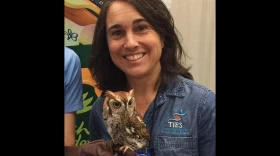
Mike Kiniry
Producermkiniry@wgcu.org
Mike Kiniry is producer of Gulf Coast Live, and co-creator and host of the WGCU podcast Three Song Stories: Biography Through Music. He first joined the WGCU team in the summer of 2003 as an intern while studying Communication at Florida Gulf Coast University.
He became the first producer of Gulf Coast Live when the show launched in 2004, and also worked as the host of All Things Considered from 2004 to 2006, and the host of Morning Edition from 2006 to 2011. He then left public radio to work as PR Director for the Alliance for the Arts for five years, and was then Principled Communicator at the election integrity company Free & Fair for a year before returning to WGCU in October, 2017.
In the past Mike has been a bartender and cook at Liquid Café in downtown Fort Myers, a golf club fixer/seller at the Broken Niblick Golf Shop in Fort Myers, and a bookseller at Ives Book Shop in Fort Myers. He lives near downtown Fort Myers with his daughter, and their dog and two cats.
-
In 2016 the nonpartisan global policy think tank RAND Corporation published a piece called "The Russian "Firehose of Falsehood" Propaganda Model: Why It Might Work and Options to Counter It" that outlined ways Russia was flooding the internet and social media with false claims, and why this technique — which featured a lack of consistency or relationship to truth — was effective in both creating confusion and getting people to tune out because there was just too much information swirling around. We talk with one of the researchers behind the 2016 perspective to learn how it came about, how they did their research, and what it means through the lens of today, far beyond Russian propaganda.
-
Dr. Stephen Knott has spent his career learning about, teaching about, and writing about Presidents of the United States of America. He is a Professor of American History & Government at Ashland University in Ohio, and Emeritus Professor of National Security Affairs at the U.S. Naval War College. He is the author of eleven books dealing with the American Presidency, the early republic, and American foreign policy. His latest, which is due out in May, is “Conspirator in Chief: The Long Tradition of Conspiracy Theories in the American Presidency” which details through extensive research and citations the ways, according to his telling, eight United States Commanders in Chief used conspiracy theories to advance their causes. They were examples, Dr. Knott would say, of the kinds of demagogues the country’s founders were concerned could someday take on the role.
-
Found on the northern end of Marco Island in 1896 during an expedition led by a renowned archeologist named Frank Hamilton Cushing, the Key Marco Cat is considered a true gem — a once in a lifetime, or more, find — discovered during the early days of the science of archeology. Just six inches tall and carved out of some sort of hardwood, the Cat, and the many other objects that were discovered alongside it, represent the most comprehensive and spectacular collection of pre-Columbian Native American material culture ever discovered in Florida.
-
Craig Pittman is a native Floridian who has written about Florida and Floridians and them any, shall we say, unique characteristics they both have. He covered environmental issues for the Tampa Bay Times for more than two decades and he now writes a weekly column for the nonprofit newsroom Florida Phoenix, and he co-hosts the “Welcome to Florida” podcast. Pittman is author of “Oh, Florida! How America's Weirdest State Influences the Rest of the Country,” and 2020’s “Cat Tale: The Wild, Weird Battle to Save the Florida Panther.” He’ll be in town on Wednesday to give a talk about Florida panthers at the Unitarian Universalist Congregation of Greater Naples so we get a preview.
-
Dr. Raymond DePaulo began as a student at the Johns Hopkins University School of Medicine in 1968 and went on to become an M.D. in 1972 and then did his residencies there. He founded the Affective Disorder Clinic in 1977 and these days he’s co-director of the Johns Hopkins Mood Disorders Center. He was on the Florida Gulf Coast University campus to give a talk for the university’s Provost’s Seminar Series so stopped by the studio for a conversation about his work and career and the changes he’s seen over the past 58 years. He also spoke with the Naples Discussion Group while he was in town.
-
Amyotrophic lateral sclerosis (ALS) is a rare, progressive, and fatal neuromuscular disease for which there is currently no known cure. It typically manifests in mid-to-late adulthood and progresses rapidly with a median survival time of two to five years, though it can sometimes progress faster. It's currently diagnosed through a long process that can often take well over a year. We learn about a new technique developed at the nonprofit Brain Chemistry Labs in Jackson, Wyoming that can diagnose ALS with a simple blood test with 97% accuracy.
-
The Center for Inquiry was founded in 1976 by the likes of Carl Sagan and Isaac Asimov to investigate what they called ‘extraordinary claims’ being made about things like paranormal activity and UFO abductions — things that fall into the category of pseudoscience. We talk with the center's Director of Education, Bertha Vazquez, about the work she does and the role of science in our lives, and the crucial need for a skeptical mind in the face of information overload.
-
Long form journalism and deep dive investigative reporting on local issues have historically been the domain of local newspapers. But as newsrooms have shrunk, gaps have been created — and a new model for local journalism has emerged in response: nonprofit newsrooms, mostly comprised of reporters who once worked for newspapers and other forms of commercial media. We meet the Executive Editor-in Chief of Suncoast Searchlight which focuses on Sarasota, Manatee, and DeSoto Counties to get a sense of their origin story and mission — and reflect on the state of local news that’s led to the rise of these online, nonprofit news organizations.
-
Despite record high stock markets, the Harry Chapin Food Bank of SWFL and its partners are busier than ever because of factors like high food, housing, and health insurance costs — along with cuts to federal programs that help people in need including $186 billion in cuts to the Supplemental Nutrition Assistance Program (SNAP) in the so-called Big Beautiful Bill. The Harry Chapin Food Bank distributed 38.7 million pounds of food last year. And to keep up with the growing need, they have begun construction of a new 110-thousand-square-foot distribution center and warehouse being built in Fort Myers that will be their new Hunger Action Center. We sit down with the food bank's president and CEO to get a sense of what they’re experiencing right now, and what the new facility will mean for their operations. We also meet the director of one of their partner agencies.
-
Emma Pattee is an accomplished climate journalist who’s written for The Atlantic, The New York Times, and more. Now we hear from her about her debut novel, Tilt.










